The Immigration Question – 1888
Introduction
The article "The Immigration Question - 1888" delves into the heated debates and concerns surrounding immigration to the United States during the late 19th century. It explores the political, social, and economic issues that were raised as large numbers of immigrants arrived in the country, particularly from Southern and Eastern Europe. The article highlights the growing tensions between native-born Americans and immigrants, the arguments for and against restricting immigration, and the potential impact of these debates on national policy.
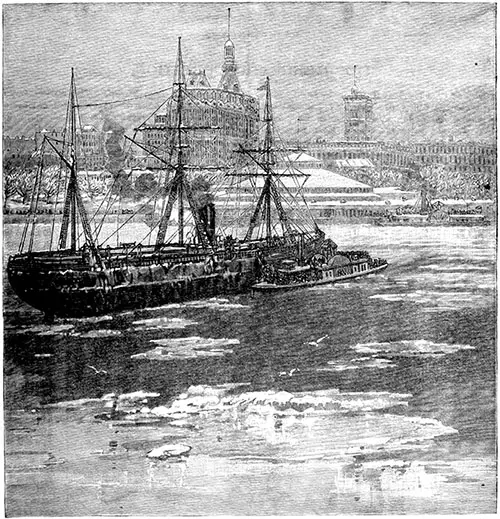
View of the Battery and Castle Garden -- The Haven of Incoming Millions. Frank Leslie's Popular Monthly, March 1888. | GGA Image ID # 14bd4c4de7
A richly illustrated article from 1888 described the vast immigration and alarms set off in two different degrees. It threw an enormous quantity of skilled and unskilled labor on the market, and native-born mechanics especially began to feel the effect of the competition.
This land of ours has been built up by immigration, and this system of filling up a country began ages ago. In this ancient continent, older by far in its present state than Europe, there must have been, from time immemorial, emigrations of vast hordes and nations so that successively, each desirable bit of country was held by a different set of inhabitants.
Tribes that were rising in the scale of civilization, acquiring arts, and showing progress in manufacture, agriculture, and government were swept aside by ruler and more warlike tribes, which, dislodged from their homes, swept down on the more peaceful and civilized, and therefore less warlike, races.
When the white settlers first came, every Indian tribe in our land had a tale to tell of how its ancestors came to the part of the country where they were found. They were but the descendants of emigrants from other parts. Then came the immigration from Europe.
The earliest may have antedated history when convulsions that did not affect America altered the western shores of Europe and submerged the islands and lands over which the Atlantic now rolls—lands that, in earlier days, gave a pathway for hordes to pass to our continent.
We all in this land now, except the red men, are emigrants from Europe or descendants of those who landed here after the middle of the sixteenth century. This diversity of origins enriches the tapestry of our history.
The first emigrants were hardy, daring men who embarked on a journey to make homes in a new and untried world. Everything was new and strange; no familiar animal and vegetable food supplies could be found, no cattle and sheep grazed in the meadows, and no fields of wheat, rye, or barley nodded with the wind. No orchards stood from year to year with ripening fruit. Many of the first bodies of settlers, like the Spaniards in Virginia, the English in Roanoke, or the French in Carolina, failed utterly and perished, except the few who escaped from land that seemed accursed of God. But their courage and determination inspired the stouter and more enduring men who undertook the task. European emigration obtained a hold on the Atlantic coast that has never been lost.
But stouter and more enduring men undertook the task. European emigration obtained a hold on the Atlantic coast that has never been lost, a testament to the enduring spirit of the American people.
The moment permanent settlements were made, immigration began. The forests were to be cleared, and the land was to be broken up and cultivated. Men were daily needed to ply the mechanical arts, run the smithy and the carpenter shop, and build the boats on which most of the early communication was carried between the waterside settlements.
Voluntary emigration steadily increased, but England soon began to send over men and women from the multitudes that crowded her jails. After a civil war, such as that of the Puritans against the Monarchy, prisoners taken in the field or inhabitants of whole districts were shipped to this country to be sold as indentured servants for a term of years.
The former was, of course, a sorry set from whom little could be expected—idle, vicious, and without any energy to begin a better life. The political prisoners were a better stock for a new country.
The 50,000 healthy, industrious Irish women sent over by Cromwell and the Scotch Highlanders who met the English regulars at Preston Pans and Culloden, though they failed to win the day, were good stock to form after generations of stalwart patriotic citizens in this country.
A third class of emigrants were those who, in the last century, came over as what were called Redemptioners.
As the sale of indentured servants had become familiar, this new system based on it arose. Vessels destined to obtain cargoes from America offered to take over those who wished to reach our shores but lacked the means to pay their passage money under certain conditions.
The ship gave them a passage and food during the voyage. For the amount thus due, each passenger had to redeem himself on arrival. If he had a friend, countryman, or relative to pay the debt against him, he stepped forth on the land of his adoption as a free man.
If not, he was sold for the lowest term of years, at which anyone at the auction would agree to take him. The excellent mechanic, or man who showed that he could readily make himself useful, was sold for a short term. At the same time, the unfortunate, out of whom a farmer thought he could not easily obtain enough labor to repay his outlay, was knocked down for a long time.
This class of immigrants seemed like they could have been more promising. Yet, we would be apt to suppose not all were the shiftless set. Several of the Declaration of Independence signers came over as Redemptioners, landing here without a penny. Still, they were men of some education, great energy, and perseverance who soon became leaders among their followers.
Naturally, those sold as Redemptioners or indentured servants endeavored to escape their servitude condition. The early newspapers of our country abound in advertisements for such fugitives, who sometimes, perhaps, could justify their action by the harsh and cruel treatment to which they had been persistently subjected.
We find an indication of the grade of some Redemptioners in the fact that many became schoolmasters in different parts of the country. Occasionally, a delivery in the newspapers of the last century will light on an advertisement for a runaway schoolmaster who had yet to serve his time as a Redemptioner fully.
Immigration to this country in the last century was large and widely distributed. There were no great ports at which all commerce centered, and many towns, from Salem to Savannah, had a large foreign trade then compared to what they do now.
A few entries in the day's papers may indicate the extent of immigration in the last century.
August 13th, 1735, a vessel at Portsmouth, N. H., with 120 Irish passengers; July, a ship at Charleston, S. C, with 250 Swiss. In Philadelphia, a single paper in August 1736 notes the arrival of two vessels with 425 passengers.
The New York Gazette, 13th-20th September 1736, notes the arrival of one ship with 345 passengers from Ireland and exclaims, "One thousand souls in twenty-four hours!"
The Snow Catharine, from Workington, Ireland, was wrecked on Cape Sable, and nearly one-half of her 202 passengers were lost.
As great as this immigration was compared to the actual population of the colonies at that time, no general system of legislation seems to have been adopted to make the immigrants useful to the little community.
They have been absorbed quickly and readily, seldom becoming a burden. Maryland, at that time fearful of any increase in its Catholic population, passed several Acts, imposing heavy and heavier fines on every Irish Papist imported into the province of Baltimore; but such checks on immigration were rare and unusual.
The number of very wealthy immigrants in early times was minimal, and of those who came over with means, intending to create great estates or build up excellent mining or manufacturing interests to continue in their families from generation to generation, scarcely enough succeeded to be at all remembered in our day.
The Van Rensselaer family in New York is one of the few exceptions. Most, like Peteri Hasenclever, expended thousands in opening mines and works from which others ultimately profited.
Thus, the immigrants were largely equal, comparatively, in means. All except the Germans who settled in Pennsylvania and the Upper Hudson and Mohawk soon lost their own language, and after one or two generations, their descendants could not be distinguished from those of English origin.
Thus, the immigrants were readily absorbed into the general community, and no complaints about them were made. Nothing in the newspapers or occasional writings of the colonial period shows any jealousy of the incoming immigration or fear that the newcomers would fail to render themselves valuable additions or prove unfit to be absorbed into the body politic.
When the Revolutionary War raised the colonies to the rank of a recognized nation under a republican government, everything about it appealed to the people of the Old World.
Europe, crushed by debts and new wars that rapidly came on, increasing the difficulties of prospering or even eking out an existence, made emigration the only hope for thousands.
A new country, where land was cheap beyond men's dreams, where grinding landlords, oppressive taxation, standing armies, and privileged closes were unknown, where every man could acquire wealth and position by industry and ability, was, in the eyes of the downtrodden, a new paradise.
Beginning under the old Redemption system, immigration to this country rapidly developed and was fostered by our Government. However, it soon outgrew the old system, and vessels competed for the transportation of those who wished to come to America.
Those who settled here saved up their earnings to send out for other family members, and as the population on the coast began to send out detachments to occupy and improve the lands in the interior, emigration furnished numbers to join in each new settlement.
The owners or captains of ships little regarded the passengers' comfort. Their accommodations were often little better than those of an enslaved person in the vessels that bore the unhappy Africans on their involuntary emigration to the shores of America.
Some of the earliest Acts of Congress regarding immigrants were intended to check the inhumanity of this system. A law passed in March 1819 limited the number of passengers that a vessel could carry to two passengers for every five tons of its bulk, as ascertained by customs-house measure.
But in those days of sailing vessels, when voyages were uncertain, the sufferings on these ships were very significant under the best circumstances.
The rate of emigration increased after the second war with Great Britain, yet in 1820, the number was only about 8,000; in 1828, no fewer than 27,382 arrived here. After 1831, the number suddenly advanced from 22,000 to 60,000 in the famous cholera year.
Ten years later, 104,565 arrived; in 1847, 234 968; in 1850, more than 300,000 came to swell our population, and in 1854, the immigrants numbered more than 400,000. But then came a falling off, and in 1861, when our Civil War began, the statistics show less than 100,000. Then the figure rose again, and in 1872, it was more than 437,000.
When steamships became numerous, they began to take large numbers of emigrants as steerage passengers. Their superior accommodations and quick passages soon secured almost the whole of the business, to the great advantage of humanity, for though laws had been passed to secure the comfort of this class of passengers, the sailing vessels showed a terrible record of mortality, the deaths being fifteen in every thousand they carried. At the same time, the steamers lost only about one in a thousand.
The vast immigration in time excited alarm in two different degrees. It threw an enormous quantity of skilled and unskilled labor on the market, and native-born mechanics especially began to feel the effect of the competition.
This led to associations endeavoring to remedy the matter. As many of the immigrants were Roman Catholics, the increase of that religious body alarmed some of the other denominations, and as many immigrants, especially Irish, availed themselves of existing laws to become citizens after the term of five years, their activity in politics gave additional umbrage.
These grounds led to the organization of the Native American party, subsequently called the "Know Nothing party." Its main object was extending the term for naturalization to twenty-one years and excluding Catholics from office.
Yet though this party at times obtained local success and more than once put forward a candidate for the Presidency, led to alarming and destructive riots, this organized hostility did not at all affect the increase of immigration.
The hostility was confined mainly to the Eastern States. At the same time, the West, which needed men to develop its resources, gladly welcomed the newcomers, and Germans especially pushed in that direction.
Their numbers, at first small, became about half that from the British Isles, but in 1854, there were 215,000 from Germany and 160,253 from the British Isles.
Given the significant influx of Swedes from Northern Europe and Italians from the South, it is curious that only one Swede arrived in 1823 and only two Italians in 1832, while in 1882, 27,484 natives of Italy and 57,664 of Norway and Sweden entered the gates of Castle Garden.
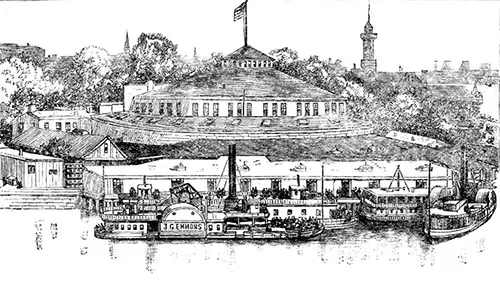
View of Castle Garden -- Several Barges Bringing More Immigrants Docked in Front. Frank Leslie's Popular Monthly, March 1888. | GGA Image ID # 14bd9e5f28
At present, Germany sends the largest number, England follows, while Ireland occupies third place, though sometimes it takes second. The Austro-Hungarian Empire, Norway and Sweden, Italy, Russia, Scotland, and Denmark represent the other great sources of new population.
Of 321,814 who arrived in 1886, about ninety-six thousand were from the British Isles, while more than twice that number were sent by Continental Europe.
But more than Europe needs to supply all our immigrants. Asia, too, has begun to contribute largely to our population, raising new questions and calling for special legislative consideration and enactment.
The development of California and the demand for labor there attracted the Chinese, and their numbers increased rapidly, so 144,328 had arrived by 1874.
An alarming feature of this class was that they were serfs, imported by large trading companies and controlled by them. Very few Chinese women came, and those who did were used for the worst purposes.
Living apart, ignorant of our civilized social rules, or indifferent to them, these Chinese wore, in a manner not amenable to our laws. It was challenging to trace or punish crime among them.
There was soon a movement against the further introduction of this undesirable class. Then came a protest against cheap labor among the working class, and many religious and moral citizens protested the heathen vices implanted on our land.
Local violence followed, and Congress was called upon to regulate the system of importing Chinese. A law passed in 1885 expressly prohibited the importation of aliens for labor or service in this country by contract or agreement, express or implied, parol or special.
This was intended to apply to Chinese immigration. Still, a church is now prosecuted under this law for contracting with a clergy member in Europe to come over and help save their souls!
The Mormon progress in Utah, with its shameless revival of polygamy, has been mainly built up by immigration, planned, concerted, and fed by Mormon agents in Europe and, to a great extent, in Scandinavia.
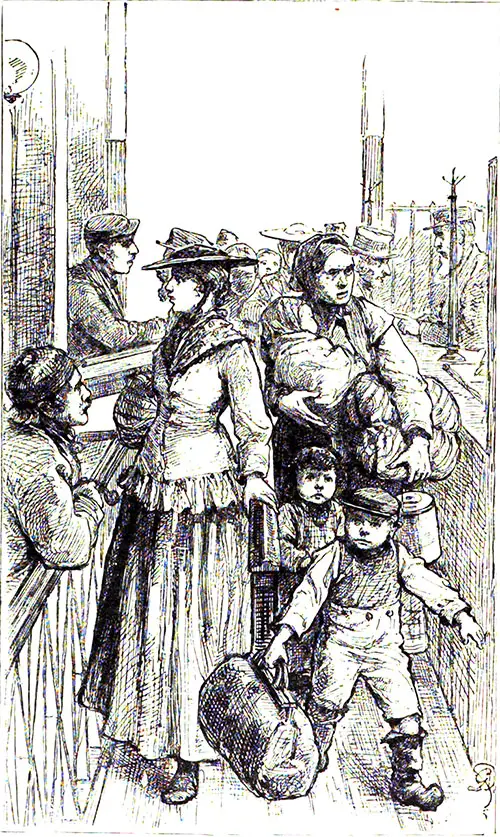
Scandinavian Immigrants at Castle Garden -- Their Destination -- Utah. Frank Leslie's Popular Monthly, March 1888. | GGA Image ID # 14becd5adc
The Mormon system grew by the neglect of Congress to check it till it had acquired strength, making its suppression difficult. Recent laws have aimed to suppress polygamy, but as long as unfortunate women are openly introduced into the country, under the sanction of the Government, to be forwarded to Utah, the evil must increase.
To check their entrance into the country seems to many the only effective means of checking the further increase of polygamy.
The system of government in Russia and some other European countries has created a vast network of secret revolutionary societies, in which the principles adopted and propagated have finally reached the point of aiming at the abolition of all rights in personal or real property and of all government.
Many of these Communists, Nihilists, and Anarchists have sought refuge in the United States and, as has been shown in Chicago, disseminated their ideas and extended their organization mainly among the Continental element here.
They show as great a hostility to this country's existing social and political life as they do to the most arbitrary and tyrannical monarchical institutions in Europe. To meet this new difficulty, means are yet to be devised.
As New York became the great port where immigration from Europe centered, the State, in 1847, created a Board of Commissioners of Emigration and required every ship bringing immigrants to pay a certain sum per head.
This money was used by the Commissioners of Emigration to protect alien passengers from fraud and imposition, to advise them how to reach their destination, and, as far as possible, to see to their welfare.
All alien passengers for whom the rate was paid were, in case of sickness or want occurring within five years after their arrival, to be supported or relieved by the Commissioners of Emigration out of the funds in their hands.
The building at the Battery, known as Castle Garden, became the receiving place for all immigrants and continues to this day.
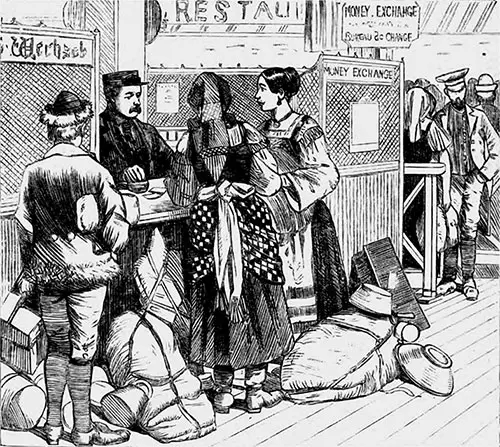
The Money Exchange at Castle Garden. Frank Leslie's Popular Monthly, March 1888. | GGA Image ID # 14bda6e48c
Large and well-fitted buildings were erected on Ward's Island for the sick and helpless. Under the management of this Board, great good was done; the poorhouses of the country were relieved of recently arrived immigrants, and these newcomers were generally protected from fraud and enabled to reach the homes they had selected, which, in most cases, soon became thriving and prosperous, according to their capacity.
Castle Garden, the great center of immigration into this country, presents a strange and picturesque scene worthy of study. Under the system built up by years of experience, these thousands of men, women, and children, arriving generally ignorant of the language and ways of the country, are rapidly parceled out. Some are conducted to the steamboat or railroad lines, others sent to Ward's Island; others are kept till friends arrive or applications for various kinds of labor take them from the employment bureau.
Licensed boardinghouses receive those who have to wait here. At every step, there are agencies to prevent fraud and imposition.
When the immigrants reach Castle Garden, they pass in single file into the rotunda, and the police officer passes them toward the registering clerk. Here, each one is asked his or her name, place of birth, and destination, and the replies are entered in an enormous ledger.
Then comes the question of departure—trains, boats, etc. — and the queries, uttered in French, Italian, Irish, Danish, Finnish, Russian, and fifty different dialects, are briefly but courteously responded to.
Those who propose remaining in New York emerge into Battery Park and are cared for by the agents of the Inman Line, who see them safely housed in respectable boardinghouses.
Those who are compelled to wait for the evening trains for the West and South encamp in the rotunda, gypsy fashion, and sit, sprawl, crouch, and lie in every attitude of indolent nonchalance.
The homes of these groups are intensely picturesque. The quaint costumes of Danish and German villages, the rich colors of Connemara cloaks, and the thousand-and-one hues of the beribboned lassies of many climes blend in glowing contrasts.
Meals are partaken of; the "tay" is wet, and the lager is foamed; children romp and play; the old people doze, and the younger take up the thread of the f1irtations commenced on the bounding billows and resolve to make the most of their time ere the bitter word of parting.
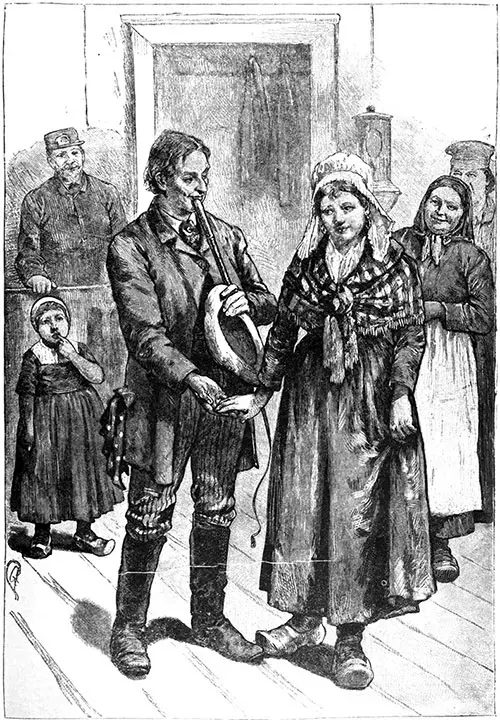
A Farmer from the Interior Seeking a Wife at Castle Garden. Frank Leslie's Popular Monthly, March 1888. | GGA Image ID # 14beab1e6d
The hour at length arrives when it becomes necessary to move toward the train. Then, there is a mighty upheaval of human forms and human impediments.
The shipping interests struggled earnestly against the laws of New York and ultimately obtained a decision of the United States Supreme Court on March 21, 1876, declaring the whole system of New York to be a violation of the Constitution of the United States, interfering with the exclusive right of Congress to regulate foreign commerce.
The case had been elaborately argued and was extended under consideration by the Justices. Miller, Justice, delivering the opinion of the Court, said regarding the Legislature of New York:
"We think that this whole subject has been confided to Congress by the Constitution; that Congress can more appropriately, and with more acceptance, exercise it than any other body known to our law, State or National; that by providing a system of laws in these matters, applicable to all ports, and all vessels, a serious question, which has long been matter of contest and complaint, may be effectually and satisfactorily settled."
But in the court of common sense, it would seem sound reasoning to hold that power so indefinite that Congress had for eighty-nine years neglected to exercise it, although the cries of suffering humanity and the welfare of the whole country demanded action, ought to be considered as abdicated and waived.
This decision, given in hesitating tones, affected not only the State of New York but all other States on the Atlantic, the Gulf of Mexico, and the Pacific. It threw their ports open and left them unprotected against the introduction of paupers and criminals, while it deprived the immigrants of every shield against fraud and oppression.
But Congress, which had for eighty-nine years been indifferent to the suffering and the welfare of the millions who poured into this country, had shown its disregard for whether these newcomers were to be made into good and valuable citizens or allowed to add new impetus to the increase of the pauper and criminal classes, was not to be roused to action by any decision of the Supreme Court.
The subject afforded no opportunity to create lucrative offices; it merely concerned the public welfare, a topic well adapted for rhetorical treatment but not of a character to influence public business.
The Commissioners of Emigration's decision could have been better. Their means of doing good were immediately cut off, and not only that, but the great shipping companies sued them for the money they had received and expended for the benefit of the immigrants.
As the shipping companies always included the tax in the passage money, decisions in their favor would have put money into the coffers of the steamship lines that came really from the immigrants but which would never be refunded to them.
The Commissioners of Emigration immediately applied to Congress to pass a law similar in effect to that which years of experience had placed on the statute book of New York. They also applied for a law to relieve them from inequitable suits against them in name, but really against the State of New York, whose agents they were.
On 19 June 1878, Congress did indeed pass an Act preventing such actions, but it was not until 22 July 1882 that Congress passed an Act regulating the great matter of immigration.
Meanwhile, the State of New York, with greater humanity and a higher sense of the national good, maintained the Commissioners of Emigration and enabled them to continue in some degree the kind work which had for years done honor to the high-minded and unblemished men who directed it. From 1876 to 1880, the General Government, or un-government, did nothing to relieve New York of this burden so generously assumed, and not till the State had expended more than six hundred thousand dollars did the United States establish an "Immigrant Fund," arising from a tax of fifty cents per head levied under an Act of 3 August 1882.
The Acts of Congress were scarcely dry when suits were begun to declare them unconstitutional, and the Supreme Court was asked to stultify itself by declaring unconstitutional Acts that it had declared the power and duty of Congress to pass.
The Court again, by the same Justice Miller as its mouthpiece, on 8 December 1884, decided that the Acts of 1882 were constitutional. But the funds provided by the Acts of Congress are totally inadequate to the Commission's wants, and it is now unable to affect much of the good it formerly accomplished.
There are thus various questions coming up before the people regarding future immigration—whether further immigration is to be encouraged or whether checks are to be placed upon it, further than those which already prevent the landing of those who, because of their condition as convicts, paupers, or persons unable to acquire a living, are almost sure to become a public burden; whether the Chinese and Mormon questions can be further solved by additional legislation; and whether Anarchism can be checked by excluding the propagators of its doctrines.
The question also arises whether a revision of the naturalization laws is required to prevent Mormon and Anarchist leaders from employing their dupes, still ignorant of the real spirit and tendency of our liberal governments, to control elections, defeat needed legislation, and promote, as far as in them lies, a return to chaos, by dissolving all the bonds that blend men in Christian society.
Naturalization is sure to come up. A general law of Congress will affect comparatively little, as even for national offices, electors' qualifications are often necessary to vote for the most popular branch of the State Legislature.
The Western States confer this right on actual settlers irrespective of United States naturalization, so Congressional laws will not materially affect them unless the Constitution of the United States is amended.
Thus, several questions regarding immigration call loudly for a general, systematic, and philosophical treatment of the whole subject after full discussion by the ablest of our statesmen.
If the topic is consigned to neglect, as it has been too frequently by Congress, evils of no little magnitude may suddenly come upon us to add weight to the growing sentiment that the General Government, as at present organized, is a detriment, not an aid, to the general progress of the country.
Of course, there will be a wide range of opinions from those who hold all checks on immigration unwise and impolitic, maintaining that it is impossible to decide whether the man who comes penniless, with a strong will and determination to succeed, or the man who comes in the cabin with abundant means is likely to be a public charge or a general benefit to the country.
If men sold on the docks as Redemptioners, in the old times, rose to be members of the body which shaped the destinies of America, held the spontaneous allegiance of the people, and maintained a seven years' war against the greatest power in Europe, why cannot the man who, today, steps penniless on the dock achieve as much?
They point to the many who come with means but who will become paupers in a few years because of a lack of thrift and judgment, injudicious investments, rash speculation, and overconfidence in others.
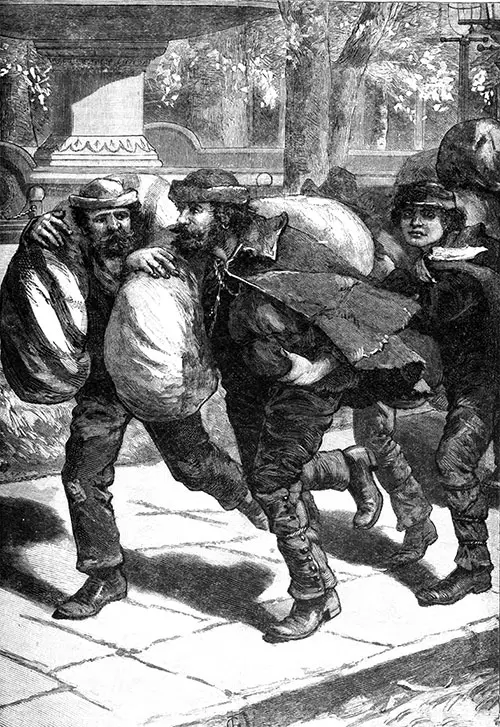
Italian Immigrants Sprinting Towards the Railway Depot from Castle Garden. Frank Leslie's Popular Monthly, March 1888. | GGA Image ID # 14bedbb176
In the brain of a disabled person, inventions may surpass Edison's. As no one can read the future or tell what innate capacities may develop under our system, why refuse any man an opportunity?
Others, at the other extreme, would require every emigrant to present a police certificate from Lis's last residence, countersigned by the American Consul, stating that the bearer has never been a convict, pauper, or placed under police supervision as a dangerous character.
In 1798, during John Adams's administration, Congress passed the famous Alien Act, which authorized the President to expel any alien plotting against the peace.
This Act drew great obloquy to the Federal party. The popular mind has vehemently opposed entrusting any such powers to the General Government. Still, early in the present session of Congress, Mr. Adams of Chicago introduced a Bill giving the President power to banish revolutionary aliens plotting against the peace and safety of the state.
The more favorable plan would be to empower the Courts to act summarily in such cases. There is a growing conviction that the Government should provide some means of protecting itself from aliens who are professed revolutionists and whose only occupation is to undermine the Government.
Others would wish some steps were taken to disabuse the ignorant women brought over by the Mormon agents to swell the number of polygamous wives in Utah and show the poor creatures that they are going to do what the laws of the country forbid and what must ultimately entail misery on them, and cover themselves and their children with disgrace and shame.
Others would counsel the passage of an Act applicable to all Territories, under which any woman, not the sole legal wife of a husband, who bears a child, may be arrested and sent out of the Territory to her native place, here or abroad, the cost of transportation to be levied on the putative father of the child; and requiring copies of such statute, in their language, to be distributed to all women landing here, that they may not claim to have acted in ignorance of the law.
The Chinese question is still crude in the statute books, and many improvements will be suggested.
Therefore, there is a call from all sides for a statesmanlike treatment of immigration and the host of questions that have already arisen or may soon arise in regard to it.
The prospect, sooner or later, of a great war in Europe that will swell the influx of newcomers makes it imperative to prepare in advance and not patch up matters with ill-advised and hasty legislation.
"The Immigration Question," in Frank Leslie's Popular Monthly, New York: Frank Leslie's Publishing House, Vol. XXV, No. 3, March 1888, pp. 259-267.
The Immigration Question – 1888
A Critical Chapter in America's Immigration Debate
The "Immigration Question – 1888" provides an insightful look into the controversies and challenges surrounding immigration during the late 19th century. This article examines the complex interplay of social, political, and economic issues sparked by the influx of immigrants, particularly from Southern and Eastern Europe, and the tensions between native-born Americans and newcomers. It is a must-read for teachers, students, genealogists, family historians, and immigration scholars seeking to understand the historical context of America's immigration policies and societal transformation.
Why This Page is Essential
- For Educators and Students
- A valuable resource for exploring the roots of immigration debates and their impact on national policy.
- Provides historical examples of how immigration shaped labor markets, politics, and societal norms.
- For Genealogists and Family Historians
- Offers context for ancestors' immigration experiences, including early policies, societal attitudes, and challenges they faced.
- Highlights immigration trends and demographics from various regions, including Europe, Asia, and Scandinavia.
- For Immigration Scholars
- Chronicles the evolution of immigration systems, from Redemptioners and indentured servants to the rise of steamship immigration.
- Discusses major legislative milestones and their long-term implications on national and state-level immigration policies.
Key Highlights
- Historical Overview:
Immigration has been a defining characteristic of the U.S., dating back to colonial times when settlers, Redemptioners, and indentured servants laid the foundation for the nation's growth. - Immigration Challenges in the 19th Century:
- Large-scale immigration fueled labor market competition, particularly affecting native-born workers.
- The rise of anti-immigration movements, such as the "Know Nothing Party," highlighted fears about cultural and religious differences, particularly regarding Catholic immigrants.
- Immigration and Labor:
- Steamship transportation revolutionized immigration, offering better conditions than sailing vessels, but concerns about cheap labor and exploitation persisted.
- Legislation aimed to prevent inhumane practices, including overcrowding on ships, and to regulate labor contracts for immigrants.
- Cultural Contributions and Conflicts:
- Immigrants from Europe, China, and other regions brought cultural diversity but also faced xenophobia and systemic discrimination.
- Groups such as the Chinese and Mormons sparked unique challenges, including debates about polygamy, labor practices, and cultural integration.
- Legislative Responses:
- The creation of Castle Garden and later federal legislation sought to regulate immigration, protect newcomers, and address fraud and exploitation.
- By 1882, Congress had established the first national immigration laws, but debates about their adequacy and enforcement persisted.
Call to Action
Explore "The Immigration Question – 1888" to uncover a pivotal chapter in America’s immigration history. This page is a rich resource for understanding the early immigration systems, the struggles faced by newcomers, and the societal shifts that shaped modern America. Whether you’re a teacher crafting lessons, a student delving into history, or a genealogist tracing family roots, this article provides essential insights into the debates and policies that defined 19th-century immigration. Dive in to connect with the past and enrich your understanding of today’s immigration conversations.
